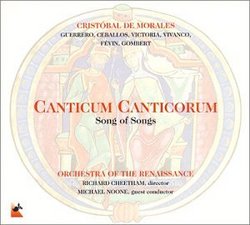| All Artists: Orch of the Renaissance Title: Canticum Canticorum: De Moraies, Guerrero, Et Al Members Wishing: 0 Total Copies: 0 Label: Glossa Release Date: 5/15/2000 Album Type: Import Genre: Classical Style: Opera & Classical Vocal Number of Discs: 1 SwapaCD Credits: 1 UPCs: 675754196622, 8424562214033 |
Search - Orch of the Renaissance :: Canticum Canticorum: De Moraies, Guerrero, Et Al
 | Orch of the Renaissance Canticum Canticorum: De Moraies, Guerrero, Et Al Genre: Classical |
Larger Image |
CD Details |
CD ReviewsA welcome addition to the discography of Spanish Renaissance hcf | 02/08/2001 (5 out of 5 stars) "With this disc, the Orchestra of the Renaissance gives us yet another window into the Golden Age of Spanish Renaissance (check out also their Cordoba Vespers and Guerrero Requiem - I am not affiliated with them in any way but I am impressed with the quality of their work). The group is uniquely suited to performing Spanish Renaissance music. Organized by Richard Cheetham - a well-known sackbut player who played with groups such as Jordi Savall's Hesperion XX - the group aims at integrating voices and instruments into seamless and historically defensible performances. The historical evidence that instruments participated in sacred ceremonies is very strong when it comes to Spain. Yet, up until today, this repertory has been dominated by a capella groups. By introducing instruments into the fabric of Spanish Renaissance music, the Orchestra of the Renaissance gives us a sound that is refreshingly different from the more familiar a capella sound (to be sure, people such as Bruno Turner have used instruments back in the 1970's, but the more prominent groups such as the Tallis Scholars have sung everything a capella). The instruments here include mostly cornets and sackbuts, but also an organ and a harp (a nice touch). The program is devoted to music based on the texts from the Biblical Song of Songs. The bulk of the recording is Morales's mass Vulnerasti Cor Meum, which was published in 1544. This mass is based on an eponymous motet (translated as "Thou hast ravished my heart") composed by Antoine de Fevin (or perhaps Jean Mouton). The mass movements are interspersed with motets, including Victoria's ravishing Nigra sum sed formosa ("I am black but I am beautiful"). The singers (a small choir of eight) include William Missin, Robert Harre-Jones and James Gilchrist. If you venture into this repertory even casually, you will know these names. They do not disappoint. --gggimpy@yahoo.com."
|
